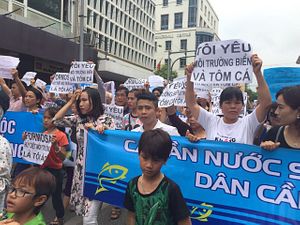In Vietnam, a scandal surrounding the mass die-off of fish has created an explosive wave of debate and activism on social media, particularly Facebook. Responding to the social media outcry, many rallied in cities across Vietnam on Sunday, during a national four-day holiday. The rallies took place at an unprecedented scale, spanning three regions.
The protests responded to the mass deaths of fish, a crisis that has been ravaging Vietnam’s four central-coast provinces since early April. The environmental disaster has killed thousands of fish and caused financial and environmental damages to fishermen and people living in what was already one of the country’s most vulnerable regions. The cause is unconfirmed as yet, but many Vietnamese suspect pollution from a steel plant operated by a subsidiary of Formosa Plastics Group.
In Hanoi, hundreds gathered near the Hanoi Opera House, holding signs that said: “Fish need clean water, people need transparency” and“Formosa, stop poisoning the sea.” The Ho Chi Minh City rally reportedly drew thousands, with clashes between police and demonstrators captured on Facebook.
Vietnamese authorities have not established a direct link between the wastewater dumped by Hung Nghiep Formosa Ha Tinh Steel Corp (part of the Taiwan-based Formosa Plastics Group). But people are demanding stronger government action to determine the real cause and alleviate the consequences of the disaster.
Environmental and social activists, along with the public, have even gathered 138,000 signatures for a petition to the White House, asking U.S. President Barack Obama to discuss the issue during his official visit to Vietnam this month.
This is the second time Vietnamese people demonstrated on the streets in response to an environmental disaster, braving the weather and the maze of undercover police to voice their concerns. Back in March 2015, citizens in Hanoi also staged a citywide protest against the local government’s arbitrary decision to chop down hundreds of trees without consulting either the public or experts.
There are some notable similarities between two incidents. Both were about the environment, both rallies used Facebook as the main organizing platform, and both demanded more transparency from the government.
Facebook, which has about 30 million users in Vietnam, has become virtually the only platform for learning about news one can’t find in the mainstream media: record of protests over social issues and clashes between people and authorities, as well as calls for petitions, rallies, and other forms of social activism.
True, the ocean of information on Facebook has made it harder for people to determine which information is valid, but it has truly elevated the power of the people in a country where public consultations on public and social projects have been rather limited and where state media has to operate under strict guidelines.
It’s nearly impossible to contain the flow of information on social media. Simmering conflicts are brought to the surface. In this case, incompetent governance was revealed.
In both the tree-cutting and fish death scandals, officials had to react following activities on social media. Following public outcry over the tree-felling fiasco, the Hanoi government reversed its decision to cut down more trees and promised a further investigation into the case.
As for the ongoing mass fish death scandal, for a month after the first dead fish appeared, the government did not offer any strong response. Just one day after the protests in major cities, Vietnamese Prime Minister Nguyen Xuan Phuc convened a working session to implement a series of emergency responses to the disaster, including monitoring Formosa’s wastewater and providing emergency aid to affected citizens.
Various ministries and government agencies have promised to investigate the situation using scientific evidence after officials from the Ministry of Natural Resources and Environment failed to convince the public and scientists alike with their theory that the “red tide” was the culprit of the disaster. Promises have been made to consult international experts as well.
Faced with such pressure, officials are also using Facebook to show the public that they care. In the central region, several high-ranking officials were shown jumping into the sea to show that the water is safe. They were also photographed eating fish near the shore.
These acts were criticized by some as shortsighted publicity stunts and were a far cry from the public’s request for more stringent environmental management policies. However, it showed that authorities are feeling the heat from social media. They know their actions are closely monitored and broadcasted — and not just by the state media, which they have a tight grip on.
It’s still early, but signs of stronger activism are unfolding in Vietnam, suggesting that people across regions and from all walks of life do share common social concerns that go beyond materialistic pursuits. The people are taking risks to voice their opinions. For many in Vietnam, Facebook has empowered them in a way that previous generations could not have imagined.
Thu Huong Le is a Vietnam-based journalist currently pursuing a master’s degree in public policy from the Lee Kuan Yew School of Public Policy in Singapore.































